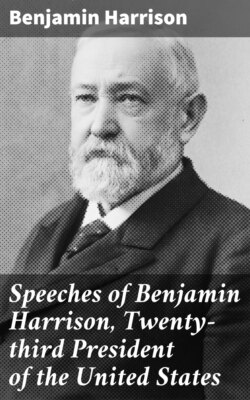Читать книгу Speeches of Benjamin Harrison, Twenty-third President of the United States - Benjamin Harrison - Страница 29
На сайте Литреса книга снята с продажи.
INDIANAPOLIS, AUGUST 7.
ОглавлениеTable of Contents
Indianapolis contained several thousand visitors at this period, in attendance on the State convention; in addition to these, however, on the seventh of August two large delegations arrived. The first came from Tippecanoe County. The city of Lafayette was represented by the Lincoln Club, H. C. Tinney, President; the Garfield Club, Henry Vinton, President; and the Young Men's Republican Club Association. Among other prominent members of the delegation were James M. Reynolds, N. I. Throckmorton, W. H. Caulkins, Charles E. Wilson, Wm. Fraser, John B. Sherwood, Charles Terry, John Opp, Alexander Stidham, Matt Heffner, S. Vater, Maurice Mayerstein, Geo. A. Harrison, W. D. Hilt, P. W. Sheehan, C. H. Henderson, Henry Marshall, J. W. Jefferson, Wm. E. Beach, John B. Gault, and H. M. Carter. Hon. B. Wilson Smith delivered an address on behalf of his townsmen.
General Harrison, in his response, touched upon the origin and principles of the Republican party. He said:
Mr. Smith and my Tippecanoe County Friends—I am very grateful for the evidence which you give me this morning by your presence, and by the kind words which your representative has addressed to me, of your respect and good-will. You are members, in great part, of a party that was not machine-made. It had its birth in an impulse that stirred simultaneously the hearts of those who loved liberty. The first convention of our party did not organize it. Those men were great, but they were delegates—representatives of principles which had already asserted their power over the consciences and the hearts of the people. [Applause.] The Republican party did not organize for spoils; it assembled about an altar of sacrifice and in a sanctuary beset with enemies. You have not forgotten our early battle-cry—"Free speech, a free press, free schools and free Territories." We have widened the last word; it is now "a free Nation." The appeals which we have made and shall yet make are addressed to the hearts, the consciences, and to the mind of our people. Therefore, we believe in schools and colleges, and seminaries of learning. Education is the great conservative and assimilating force. A doubter is not necessarily an evil person. The capacity to doubt implies reason—the power of solving doubts; and if the doubt is accompanied with a purpose to find the truth and a supreme affection for the truth when it is found, he will not go widely astray. Therefore, in our political campaigns let men think for themselves, and the truth will assert its sway over the minds of our people. Then everything that affects the record and character of the candidate and the principles of the parties will be brought to a safe tribunal whose judgment will be right. [Great applause and cries of "Good!"]
I am not unaware of the fact that some of you had another convention preference, but I have always believed that convention preferences should be free in the Republican party [applause], and that no prejudice should follow any Republican on account of that preference. As party men, we will judge a man by his post-convention conduct.
The second delegation comprised fifteen hundred citizens from Vanderburg County. The Tippecanoe Club of Evansville, with sixty veterans, led the column.
Leaders in the delegation were ex-Congressman Heilman, Henry S. Bennett, Chas. H. McCarer, J. E. Iglehart, W. A. Wheeler, C. R. Howe, J. W. Compton, S. B. Sansom, S. A. Bate, John H. Osborn, John W. Davidson, Henry Ludwig, Wm. Koelling, A. S. Glover, J. W. Roelker, R. C. Wilkinson, James D. Parvin, Wm. Warren, Chas. L. Roberts, and Geo. N. Wells.
Dr. W. G. Ralston delivered an address in the name of the delegation.
General Harrison, in reply, said:
My Good Friends from the Pocket—I feel very much complimented by your visit to-day. Your coming here from so great a distance involved much inconvenience which those who live nearer have not experienced. You are geographically remote, but it does not follow from that that you are remote from the sources of political influence and political power.
The General then spoke of the extension of the Republican party from the lakes to the Ohio in Indiana and all over the North, saying that geographical lines marked its limits only in the South. He said that the people of Vanderburg County, living as they did on the Ohio River, a river that some men sought to make the division line between two governments, knew what it was to guard their homes and what it was to send out veterans from the sturdy yeomanry to the defence of their country. He referred in the highest terms to General Shackelford and his service in the hour of his country's need. "I greet you to-day," he continued, "as Republicans—men whose judgment and conscience compel their political opinions. It does not fall to my lot now to argue or discuss at length any of the great political questions of the day. I have done that in the past. It is reserved for others in this campaign. I recall with pleasure my frequent visits to you and your cordial reception when I came to speak to you. In this contest others will maintain before you that great policy which, we believe, dignifies every American, both at home and abroad."
Speaking in reference to wages, General Harrison said that he thought we often forget the women who were compelled to work for their daily bread. He sometimes thought those persons who demand cheaper coats would be ashamed of themselves if they could realize that their demand cut the wages of the women who made these coats. In concluding, he greeted and thanked the Tippecanoe Club for coming, and the Young Men's Republican Club also, saying that he had heard of their efficient work in the highest terms of praise.
